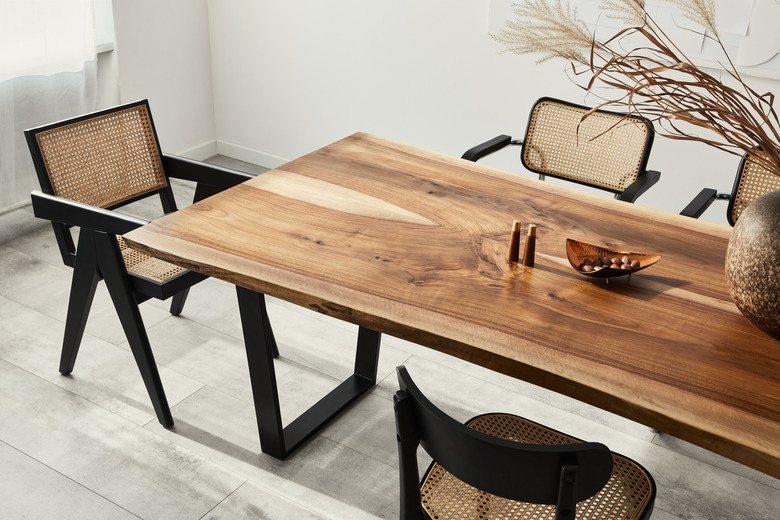How To Clean Wood Furniture With Lemon Oil
We may receive a commission on purchases made from links.
Lemons aren't just for making delicious lemonade on a hot summer's day; you can also use lemon oil for wood furniture. Lemon oil helps bring your dull hardwood furniture back to life by replenishing the wood's oils, and it prevents it from cracking by adding moisture to its surface. Not only does it give your wooden furniture a sparkling shine but lemons are a natural cleaning agent and are fantastic for removing water stains, grease, and even rust. It doesn't hurt that lemon oil smells great too.
Lemon oil is easy to come by. Just grab a lemon and squeeze out its juice for the best and purest form. You can also use lemon essential oil as a reliable second choice.
When Should I Not Use Lemon Oil?
When Should I Not Use Lemon Oil?
Since lemon oil doesn't leave a film once dried, it works better as a polisher and cleaner than as a protectant. If you want to add a protective layer to your wooden furniture after treating it with lemon oil, use beeswax or wax compound for best results. It's also best to avoid using it on antique furniture due to its high acidity that could remove the wood's finish.
Tip
If you have a wooden coffee table, always use coasters to help prevent scratches and stains.
Can Lemon Oil Be Used on Wood Floors?
Can Lemon Oil Be Used on Wood Floors?
There seems to be some debate on whether you should use lemon oil to clean hardwood floors. While lemons are a natural cleaning agent and help restore wood's shine and oils, they are also abrasive and may remove particular finishes on wooden surfaces. Also, if you're using a lemon and water mixture on your floors, it may actually dry them out over time. In addition, using lemon oil on your wooden floors can make them slippery and cause an unexpected accident. As a rule of thumb, use cleaners made specifically for your wooden floor's finish for best results and longevity.
Which Is Better for Wood: Lemon Oil or Orange Oil?
Which Is Better for Wood: Lemon Oil or Orange Oil?
Both lemon oil and orange oil work as natural cleaning agents and provide moisture to dry wood. Depending on your needs, it may be better to use orange oil instead of lemon oil.
If you're cleaning antique furniture, reach for orange oil since it's less abrasive than lemon oil. Orange oil is also great for removing tough grease buildup that you might find on kitchen cabinets. Orange oil can also treat a dry wood termite infestation if sprayed directly on the pesky critters.
How to Clean Wood Furniture With Lemon Oil
1. Dust the Surface of Your Furniture
Use a feather duster or soft cloth to remove dust or dirt from the surface of your furniture. If your furniture is covered in a thick layer of dust or cobwebs, use a vacuum cleaner attachment to remove debris.
2. Make Your Lemon Oil Mixture
There are a few different mixtures you can make using lemon oil for wood furniture depending on your furnishings and what products you have around your house.
One way to clean wood furniture is by using lemon oil by itself. For this, use pure lemon oil or pure lemon essential oil.
If the wooden surface has a varnish, shake up 1/2 cup of warm water with three to four drops of lemon oil. For unvarnished wood, mix together 2 teaspoons of olive oil and 2 teaspoons of lemon oil.
To mix a moisturizing lemon oil furniture polish, use 3/4 cup of olive oil, 1/2 cup of distilled vinegar, and 1 tablespoon of lemon oil.
Tip
If you have a stubborn stain, put a little toothpaste on the stain and brush it with the toothbrush. Then, apply lemon oil for additional cleaning and polishing.
3. Wipe Your Furniture Clean
Once your lemon oil solution is ready, spray or drop some on a soft lint-free cloth and apply it to the wood's surface, making sure to go with the grain. Apply more lemon oil with a spray bottle or cloth and continue to wipe the piece of furniture until its surface is covered and clean.
4. Let the Lemon Oil Dry
Let the lemon oil dry on your furniture. Once dried, apply a protective finish to your piece if needed.
